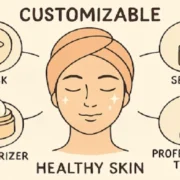The things a kid is exposed to affect their health in more ways than one. When it comes to a child’s health, genes are very important. In many ways, the DNA that is passed down affects their health, from physical traits to the chance of getting sick.
Parents can choose better if they know about these genetic links. People who know how genes work can take steps to make sure their child is healthy and has the best start in life.
Inherited Traits and Physical Appearance
The bodies of children often look like those of their parents. Height, eye color, and hair form are all things that can be passed down. These traits come from genes that work together from both parents.
People can also find it hard to move around if they have certain body parts. Some things, like the shape of bones or the way muscles are made, can be passed down. If they are passed down, they can change how a child grows and develops physically.
Genetic Risk for Chronic Diseases
Some long-term illnesses are linked to genes. People with diabetes, heart disease, and some types of cancer may have a higher chance of getting them. If a parent has had one of these conditions in the past, their child may be more likely to get them too.
Knowing about these risks can help with early prevention. It’s wise to prepare for parenthood with genetic screening. This process helps identify inherited conditions that could affect the child.
Growth and Development Patterns
Genes decide how fast a child grows. For example, depending on their genes, some kids may go through growth spurts earlier or later than others. The parents’ height and shape can often tell you what size child they will be.
Genes can affect more than just physical growth. They can also affect movement skills. Depending on how they were inherited, fine and gross motor skills may grow more or less quickly. Parents can set reasonable goals for their kids if they notice these trends.
Weight Management and Body Composition
Genes can change how a child’s body breaks down food. Metabolism and fat stores are part of this. The parents of a child can affect how likely they are to be overweight or thin.
Genes are important, but how you live your life is also important. It is very important to promote healthy eating and physical exercise. This can help balance out genetic traits with healthy ways to lose weight.
Immune System Strength
Some of the immune system’s power to fight off sickness is passed down from parent to child. Some kids may be less likely to get sick if their parents don’t get sick. In the other direction, genetic traits like autoimmune diseases can also be passed down.
Getting to know a child’s genetic protection can help with their health care. Getting vaccinated and eating well can help their immune systems. Their immune system stays strong thanks to regular check-ups.
Sleep Patterns and Circadian Rhythms
Genes can change a child’s normal sleep-wake cycle and how well they sleep. Kids may take on the habits of parents who are light sleepers or night owls. These trends in a child’s genes can affect how easily they fall asleep and stay asleep.
Parents can set up good bedtime routines by being aware of these tendencies. Making changes to a child’s bedtime routine to fit their natural rhythm helps them sleep better. A child who gets enough sleep is more alert and able to concentrate during the day.
Cognitive Development and Intelligence
Genes influence how a child’s brain develops. Cognitive abilities, including memory and problem-solving skills, often have genetic roots. The surroundings are important, but the genes of the parents set the stage.
These genetic strengths can be built upon by parents who value learning. Reading, puzzles, and artistic play are all good ways to keep your brain healthy. A child’s intelligence is shaped by this balance of genes and surroundings.
Mental Health Tendencies
Anxiety, sadness, and other mental illnesses may be linked to genes. If both parents have these problems, the child may also have them. Genetics don’t, however, ensure that these problems will arise.
Making a welcoming space is very important. Being able to talk to each other and get mental health help can make a big difference. Getting involved early can also keep small problems from getting worse.
Risk of Allergies and Asthma
A lot of the time, allergies and asthma run in families. These conditions may be more likely to happen to a child if one or both of their parents have them. Genetic testing can help figure out what these risks are.
Parents can make their homes less likely to be caused. Keeping the air clean and staying away from allergens can help. Early diagnosis makes sure that control and treatment work well.
Digestive Health and Food Tolerances
The genes of a child can affect how well they digest certain foods. Lactose intolerance and gluten sensitivity are two conditions that tend to run in families. The kinds of foods a child can easily eat may be affected by these genetic factors.
Parents can change their family’s food if they know about these possible problems. Making healthy food options available makes sure that a child’s nutritional needs are met. Getting regular checkups with a doctor or chef can help you deal with any problems you’re having with food.
Vision and Hearing Health
Eye and hearing problems tend to be passed down from parent to child. Kids may need glasses or have trouble hearing if their parents do. By getting regular check-ups, these issues can be found early.
Some diseases, like color blindness or hearing loss that starts at birth, are passed down through genes alone. If the problem is found early, the right help can be given. This helps kids do well no matter what problems they face.
Skin Conditions and Sensitivities
Skin problems like psoriasis, acne, or eczema can run in the family. If both parents have sensitive skin, it’s possible that their kids will too. People with these conditions often get them early in life.
To take care of sensitive skin, you need to do preventative care. It can help to use gentle products and keep the face moist. A dermatologist can also give you personalized treatment suggestions.
Unique Traits and Talents
A child’s natural skills are also affected by their genes. It’s common for musical, sports, or artistic skills to run in families. These traits might be clear from a very young age.
Kids can reach their full potential if these skills are developed. It helps a lot to have help and practice. Genetics may light the spark, but hard work is what makes success happen.
Empowering Parents to Nurture a Healthy Small Child
A child’s health and growth depend a lot on their genes. Parents can make better choices if they know about these genetic factors. From keeping diseases away to helping talented people, education is very important.
Parents can give their kids the care they need by learning about the things that make each child special. Living a healthy life, getting regular check-ups, and getting screened early all make a difference. Every little kid should have the best start in life. Families can help their kids do well if they love them and plan ahead.
Caring Touch Home Health Makes a Difference in Patients’ Lives










Comments